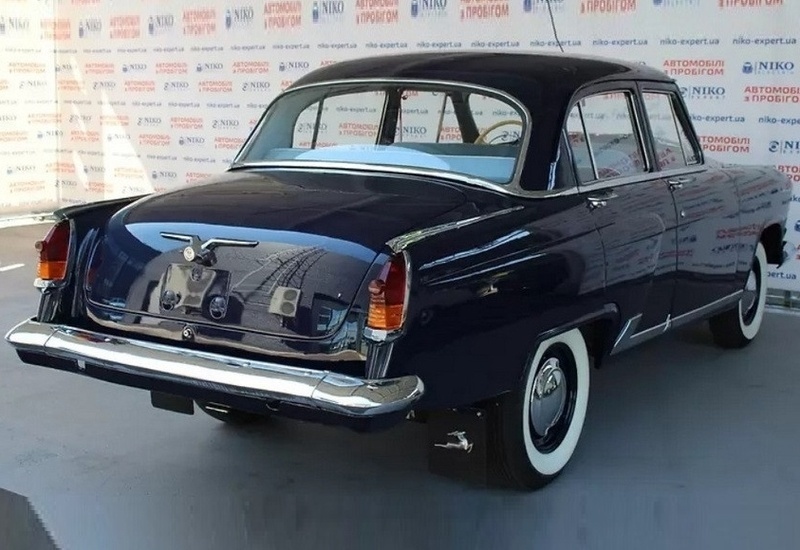Classic cars have an uncanny ability to stir emotions, evoking a sense of nostalgia with their vintage aesthetics and showcasing the exceptional craftsmanship of eras past. These vehicles are more than just modes of transportation; they are windows into history, reflecting the evolution of technology, design, and culture. Among these automotive marvels, the GAZ 23 stands out as a symbol of both Soviet engineering prowess and the socio-political landscape of post-World War II Russia.
Unveiling the GAZ 23: An In-Depth Analysis
The GAZ 23, affectionately known as the Volga, holds a special place in the annals of automotive history. Produced by the Gorky Automobile Plant (GAZ), this vehicle represents a significant blend of history and technology. Its production spanned from 1962 to 1970, an impressive duration that underscores its lasting impact. Initially intended as a luxury car for the Soviet elite, the Volga quickly gained recognition for its durability, spaciousness, comfort, and exceptional performance even under challenging circumstances. This reputation made it a preferred choice not only for civilians but also for taxi drivers, chauffeurs, and law enforcement.
The Enchanting Features
The GAZ 23 served as a testing ground for innovative concepts in automotive design and engineering. Drawing inspiration from Western styling cues, the car underwent size and power upgrades to rival American and European counterparts. Its distinct design incorporated aerodynamic elements, featuring a streamlined body and rounded edges that lent it an air of elegance and readiness for both the streets and the showrooms.
Under the hood, the Volga boasted cutting-edge technology for its time. Equipped with a 5.5-liter V8 engine, its highest specification churned out an impressive 195 horsepower, enabling it to reach a top speed of 170 km/h (105 mph) and accelerate from 0 to 60 mph in approximately 16 seconds. Moreover, the GAZ 23 pioneered the use of hydraulic jacks, enhancing ride comfort and overall drivability. Its four-wheel independent suspension system, a novel concept in Russian automobiles, effectively dampened road imperfections, ensuring a smooth and pleasant ride.
GAZ 23’s Enduring Impact on the World of Classic Cars
The influence of the GAZ 23 reverberates across the global landscape of classic cars, cementing its status as a pivotal figure in 20th-century automotive history. More than just a collection of metal and machinery, it encapsulates a pivotal period of technological advancement and cultural transformation. The GAZ 23 has become a cherished relic of history, revered by enthusiasts and collectors worldwide. Its historical significance, robust construction, unique innovations, and the narrative it weaves into the intricate tapestry of automotive history make it an object of desire and admiration.
The GAZ 23 in Modern Times: A Link to the Past

In an era dominated by sleek and futuristic designs, the GAZ 23 emerges as a bridge between the past and the present. Its presence at classic car events and exhibitions serves as a reminder of the elegance and sophistication that once defined the roadways. Car aficionados, young and old, are drawn to its timeless beauty, often drawing parallels between the Volga and the modern luxury cars of today. The GAZ 23 stands not only as an automotive icon but also as a testament to the enduring allure of vintage automobiles.
Preservation Efforts and Restoration Projects
Preserving the legacy of the GAZ 23 is a labor of love for dedicated individuals and organizations. Restoration projects breathe new life into these classic vehicles, meticulously bringing them back to their original splendor. The process involves sourcing authentic parts, ensuring period-accurate details, and reviving the mechanical marvel that once graced the roads. The sight of a meticulously restored GAZ 23 is a testament to the passion and commitment of those who recognize the value of preserving automotive heritage.
In Conclusion: Unraveling the Enchantment
As we traverse the legacy and influence of the GAZ 23, the enchantment of the classic car realm comes to life. From its inception, remarkable features, and technical innovations to its lasting legacy in the automotive universe, the GAZ 23 transcends its status as a mere car. It represents a masterpiece of engineering excellence, carrying within its metal frame stories and echoes of a bygone era. it is a manifestation of the enduring cultural and technological significance that resonates within the hearts of car aficionados.
FAQs About the GAZ 23 and Classic Cars
Q1: What makes the GAZ 23 unique among classic cars?
This car, also known as Volga, stands out due to its blend of Soviet engineering, luxurious features, and enduring performance.
Q2: Was the GAZ 23 widely used outside of the Soviet Union?
While its primary market was the Soviet Union, it gained recognition and enthusiasts worldwide.
Q3: Are GAZ 23 cars still in operation today?
Yes, many GAZ 23 cars are meticulously preserved by collectors and still participate in classic car events.
Q4: How does the GAZ 23 compare to contemporary luxury cars?
Its unique design, historical significance, and distinctive features set it apart from modern luxury cars.
Q5: Can you visit museums to see the GAZ 23?
Absolutely, various automotive museums around the world feature the GAZ 23 as a testament to automotive history.
The Ongoing Story of the GAZ 23
As time marches forward, the GAZ 23 continues to captivate hearts and minds. Its enduring legacy reminds us of an era when cars were more than just machines; they were expressions of art and ingenuity. The stories of the GAZ 23’s journeys, the lives it touched, and the memories it created are woven into its gleaming exterior and powerful engine. It remains a symbol of the past, an inspiration for the present, and a beacon for future generations who seek to understand the magic of classic cars.


